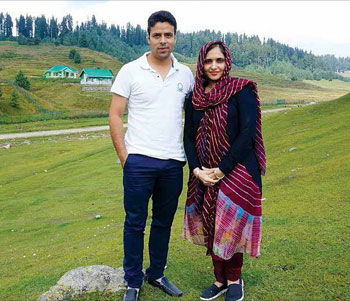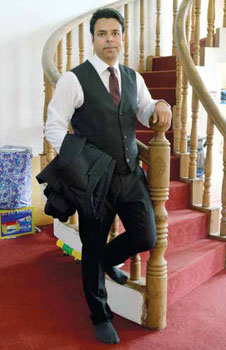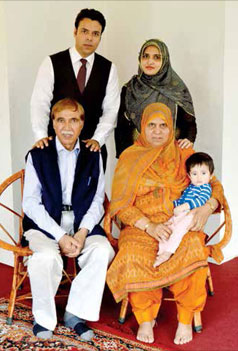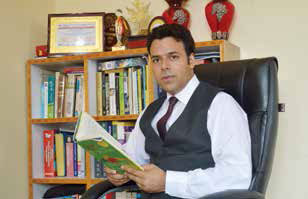Dr Bilal Bhat hails from strife-torn North Kashmir, his childhood spent under the crossfires of a militancy riven, military ridden region. His wife Rehmat hails from Karnataka. But Bilal proved his mettle, as he emerged tempered by the fires, as it were, by securing 10th rank in the prestigious UPSC merit list. Both have their fathers as role models in joining the civil services as well as seeing it as a means to deliver ‘good’ to the people. While Bilal has served in Uttar Pradesh and hopes to join the Kashmir cadre, Rehmat works in Karnataka. How do they grapple with the pushes and pulls of highly demanding jobs and long distance marriage? What is the binding factor? Rehmat and Bilal Bhat share their secret....
-Bilal

Bilal Bhat hails from the remote village of Kupwara in the remote border district of Handwara in strife-torn North Kashmir. Until recently, he was the State Forest Officer from Uttar Pradesh. In July this year, he ranked 10th in the All India merit list of UPSC examination and is now all set to be an IAS officer, hoping to get his state cadre. “Words can hardly describe my feelings. I’m on the top of the world,’’ he had told PTI when he passed the prestigious examination.
Speaking to Corporate Citizen, he said, “It is a great feeling because the standards you are judged by in UPSC is high and the success reflects how each and every effort you have put in has paid off. For the last one year it was sheer hard work for me and nothing else. More important was to maintain the tempo and interest throughout the process of the examination.’’
Omar Abdullah, former Chief Minister of J&K had tweeted: ‘Congratulations to all who passed the UPSC Exam esp Bilal Mohiuddin Bhat, resident of Srinagar for securing 10th position. Well done!’ — Omar Abdullah (@abdullah_omar) May 31, 2017.
Earlier, he graduated as a Veterinary Doctor. His wife, Rehmat Bhat, has recently been appointed as Assistant Director with the tourism department of the Karnataka government. Like Bilal’s father, her father too is a former civil services officer, but of Karnataka government. They have an infant daughter, Mariam. Due to Bilal’s training period, which will shortly begin in Mussoorie before he joins the IAS, and Rehmat to serve in Karnataka, they will have a long-distance marriage for some time. This young and dashing couple is not worried though, as they have family support to look after their baby.
‘For any marriage to be successful one needs patience, adaptability and respect for each other’s thought processes. Two individuals collide at some point and sometimes integrate. It is up to both to work intelligently, for the love for each other'

It is worth considering Bilal Bhat’s achievement against the backdrop of the state he hails from. His home town is in Kupwara district where Army base camps are constantly under fire by the militants. According to the Economic Survey 2016 presented recently by the Jammu & Kashmir government, the state lost RS. 16,000 crore due to violence during the 2016 summer months. This, besides laxity in governance, and government schemes and infrastructure projects not getting implemented. Due to long drawn curfews, particularly between July 2016 and November 2016, the economy also suffered due to low tourism and industrial activity.
A news report of 2007 on the website www.jammu-kashmir.com, it is pertinent to be mentioned here, as it was during this period that Bilal Bhat was growing up. The heart rending report says: “For a Kashmiri mother, the uncanny apprehension about the safe return of her son or daughter during the last 17 years of conflict has never abandoned her while seeing them off in the morning for the day's work. Kashmiri mothers have a typical style of seeing off their wards. Prayers gush out in abundance when a son or daughter leaves the home in the morning, asking the mother: Mouji Bahai Narai. (Mom, I am leaving).
“Those thousands of mothers, grandmothers and spouses, who had to come to terms with the most agonising experience of receiving the dead bodies of their loved ones, have unfortunately seen their apprehensions turning to be a reality. Public places in Kashmir like open fields, bus terminals, roadsides, residential areas and recreational spots have witnessed the dance of death over these years caused by variegated ogres in the form of cross-firing incidents, grenade attacks, bomb blasts and landmine explosions.
“The official records reveal that 5615 IED blasts, 11,660 grenade explosions, 786 rocket attacks, 14,826 random firing incidents and 21,309 cross firing incidents have occurred over the last 17 years of unceasing conflict. Kashmiris have seen their public places shrinking for them with meshes of barbed wire crisscrossing on the roads, bunkers erupting everywhere and security men flaunting their weapons at every possible place; roadsides, check-posts, streets, street-crossings, pavements, traffic junctions, near schools, hospitals, shrines, tourist spots, in and around rice fields, maize fields, vegetable fields, orchards and where not.’’
Corporate Citizen caught up with Rehmat and Dr Bilal Bhat for an in-depth interview on their personal and professional success, marriage and balancing work and home life.

Bilal Bhat: Well, I was inspired by my father. He was in the Kashmir services. I spent my childhood in a conflict prone district. I was born in a village of Haripura in Kupwara where militancy is rampant. Then we shifted to Srinagar where I did my schooling in Minto Circle. My childhood days have been full of colours of love, social fear, celebration, strikes, curfews, shutdowns. I was exposed to the hard realities very early in life. Maybe that has helped me to attain emotional maturity at a younger age and I viewed the world in a different way as compared to those in stable areas. But all this helped build the needed determination for my career and goal in life.
I always thought of the common man who is unaware of the outside world and often the victim of the turbulence in our state. So, there was this desire in me to bring administration to the grassroots level and deliver effectively.
The civil services give you the required platform to work in areas that touch the lives of many. After all, in life one needs to become relevant to the society along with achieving personal growth. This service gives you the opportunity to be dynamic and work in different challenging areas that are basic to the survival of the society.
Rehmat Bhat: My father was also in the civil services, in Karnataka. I was greatly inspired by the way he worked, his energy and proactive lifestyle - all my inspiration came from him. He has the rare capability to make any good idea work, especially the one that benefits people at large. Civil service is one of the distinguished services of the nation and we need talent, energy and intelligent, hardworking officers to move this government machinery. I feel it is one way to contribute to better the life of others and an opportunity to apply intelligence and potential for a good cause.
‘I was exposed to the hard realities very early in life. Maybe that has helped me to attain emotional maturity at a younger age and I viewed the world in a different way as compared to those in stable areas'
-Bilal

Bilal: I was undergoing training in Dehradun, after which I was posted to Gonda in Uttar Pradesh. I dealt with social forestry and related issues. I learnt a lot about the nature of work there. I initiated several events like involving the local community in forest fests. I arranged bird watching during winter for school children and educated them briefly about the importance of wildlife, forest and the environment. So I enjoyed working in the Kuana Forest Range there. The bad experience was the connectivity issue there. It was difficult travelling, but a great learning experience.
My cadre for forest services was UP so I know about the forests there. In Kashmir, I feel the forest is mainly in Kashmir whereas Ladakh Region has less forest. Also, compared to other states, the forest as such is intact in Kashmir. There is no major destruction done, either to the wildlife or forestry as compared to the rest of India.
Rehmat: I have been selected as Assistant Director Tourism this year. Earlier I was Deputy SP, Karnataka Government. I have still not started work in the new assignment. But I feel there is great potential to attract tourists - both national and international-because Karnataka has one of the best medieval temple architectures, sea shores, wildlife in the Western Ghats and is a hotspot for several species. It also has salubrious climate and great connectivity. It has metros and smart cities that make the stay for tourists a pleasure. Moreover the luxurious train tourism is another attraction for those who love to have a glimpse of life in India along with the travel.

It may not have been a love marriage, but like they say, marriages are made in heaven and this union is indeed a true representation. Says Bilal with pride, “Ours was an arranged marriage, arranged by the elders, but it was love at first sight, followed by great chemistry and blessings from the Almighty.’’ Adds Rehmat, “I feel the arranged marriage instantly turned to love and I feel great about it.’’
What did they like about each other? Says Bilal, “I feel both of us are crazy about good work. Both of us are imperfect and strangely share the same qualities; the only difference is that our timings are happily different. Like, when I am impatient, my wife is calm. And when she is stubborn, I am easy going. So it is divinely fixed by the Heaven Above. And she has been my source of strength throughout my struggle.’’ Agrees Rehmat, when she says, “Yes, I agree there is nothing like I have some qualities and he has another set. It is just the perfect timing. He has always supported, encouraged and motivated me to be myself and that is why I am able to evolve as a better version of myself each day.’’
She further states, “Dr Bhat has this great quality of making things light for me by just laughing at it. He is humble, caring and has a great sense of humour. He is an eleventh-hour person and so hurries up at the end, while I am a slow and steady planner. As he says, it is divinely matched, so no issues.’’
Bilal proudly says about Rehmat, “She is methodical and disciplined in her lifestyle. She thinks in many different dimensions and manages me well. Her energy and activeness motivates me to do more for her. All dislikes turn to likes when two people care enough and trust each other. So it gets fine in the end.’’
‘The civil services give you the required platform to work in areas that touch the lives of many. After all, in life one needs to become relevant to the society, along with achieving personal growth. This service gives you the opportunity to be dynamic and work in different challenging areas that are basic to the survival of the society’
-Bilal

Says Bilal, “For any marriage to be successful one needs patience, adaptability and respect for each other's thought processes. Two individuals collide at some point and sometimes integrate. It is up to both to work intelligently, for the love for each other.
Says Rehmat, with a twinkle in her eyes, “Yes, I agree because we are brought up in different cultures but different people with different views can make the journey complete and beautiful. Both need to have mutual understanding and be responsible towards each other. I feel youngsters must select their life partners with deep thought and not adopt shallow considerations such as looks, position, etc.’’
How are they managing long distance marriage, with Rehmat in the Karnataka cadre and Bilal all set to go to Mussoorie for training? Says Bilal, “Well, so far we have managed with the help of family, sometimes alone, sometimes together... distances don't bother us anymore.’’
Rehmat, who is a new mother, confesses, “Yes, it is difficult sometimes, especially when you have kids, but I guess it can be managed, provided we know how to handle it. Ambition and career need not be sacrificed for trivial reasons but togetherness cannot be traded off for a career that demands long distances in time and space, because I feel the kids need both parents in their life and that is important for me.”
 Dr Bilal Bhat and Rehmat with his parents Mohiuddin and Fatima Bhat and daughter Mariam
Dr Bilal Bhat and Rehmat with his parents Mohiuddin and Fatima Bhat and daughter MariamSays Bilal proudly, “My little daughter is the apple of my eye. Right from feeding to putting her to sleep I do everything for her. Parents must not force kids of any age, but let them explore. But parents must create an atmosphere where they pick up the right attitude, right sense of life and imbibe the values we practice, but all by choice and an open mind. I would want my kids to develop the right bent of mind towards self and life in particular. I want them to be strong in values and true to their selves.”
For Rehmat, it is a double whammy. Says she, “Well, in terms of parenting, my job is double as I need to be there 24*7 with my daughter, like every mother. Yes, I agree that forcing kids would make them stubborn, educating them enough to instil all the right values is essential and for that both of us need to work to create that environment where our kids grow and learn without compulsion, fear or hesitation.”
Bilal: We all know the role of a bureaucrat is to deliver to the public at large. Yes, it is true that corruption has handicapped the whole system. Misuse of power and position is seen everywhere. I feel we need more checks and balances, more transparency and a vigilance not just from enforcement agencies but from the civil society. Still, I feel all this is not enough if there is no attitudinal change by all sections of society -- by those who are compelled to bribe, and those who accept the bribes.
Rehmat: The role of bureaucrats is indispensable for the society. From the cradle to the grave we need a system and group of officials to run the chores of public life. Corruption in the system has hollowed it from within. It is like a monster destroying the good work. I feel the new lot that is entering the administration must clean this malaise and maintain professional dignity and integration without falling prey to such shallow practices of corruption or misuse of authority.
‘Central teams, civil groups and activists now realise the harm done to the larger community that has nothing to do with militants or the military. All they need is the system to deliver basic amenities, infrastructure, may be more schools, professional colleges, industries, more connectivity, more employment, health, disaster management−in a nutshell, more work on the ground rather than mere promises’
-Bilal
Intellect is not born in a day. It includes discipline, ambition and the will power to fulfil those dreams. You may think whether I have the capacity to scare someone, but as Deputy Superintendent of Police of Karnataka, I have handled weapons, even AK 47 guns. You need to sit down calmly and plan out your career. You should shape your own personality and become relevant to society. I got into police service. At that age it looked nice; I saw reality of life at close quarters. I got out of it and entered the corporate world, which gave me a different perspective. Thereafter, I went back to Karnataka State services and would now hold the charge of Assistant Director, Karnataka Tourism. Maybe after some time, I would try to get into a business enterprise. There is a subject called General Studies in UPSC which will help you in gaining entry into practically all other fields. You need not stop at just one profession.
I am a daughter-in-law of Kashmir. Every two days there is curfew in Kupwara, where my husband hails from. He has seen conflict from child but that has helped him to come out strong. Students in cities are hardly under pressure; they are in cool comfort as compared to youngsters in strife-torn States like Kashmir.
Students, who are mostly in their early 20's have this emotional balance. Don’t worry about getting a life partner; someone is sure to hold your hand. I’m lucky that I have a wonderful partner. He praises me a bit too much sometimes. But think of us and our lives in Kashmir. During the floods, we didn’t have power and the Army came to rescue our baby from there.
Students should make a diary and write down all their dreams; even if it mean getting wet in the rains. Fulfil every dream of yours. Make a beautiful plan for yourself.
Bilal: Well, I must say a paradise resides here: Beautiful landscapes, our climate and our own cuisine and culture with a fragrance of mystic love and splendour. I don't need to give reasons why Kashmir should be our pride in this regard. But yes, there is perennial turmoil and conflict here. Militants and the military both have paused its growth and development.

Bilal: I have met a lot of people from different regions of India. I have seen a lot of sympathy in their heart for the Kashmiris. People are educated and can differentiate between militants, military and the common people. People today understand all sides of the chaos going on there. The media is open today and every bit is publicized unlike in the 90s, so the issue is getting different viewpoints from the masses everywhere. Central teams, civil groups and activists now realise the harm done to the larger community that has nothing to do with militants or the military. All they need is the system to deliver basic amenities, infrastructure, may be more schools, professional colleges, industries, and more connectivity, more employment, health, and disaster management. In a nutshell, more work on the ground rather than mere promises.
Bilal: The best places in Kashmir are in its villages. That beauty is still unseen and unknown to many. All that the world sees is a small glimpse, but the real beauty thrives silently in its interiors.
Rehmat: I love the lakes on the higher altitudes that often change their complexion. Sometimes they melt and sometimes freeze. All the places manifest the best geological formation of the era.
Bilal: Life is simple, let's not complicate it. Destiny is destined, but hard work should be the only visible reality and everything else will follow.
Rehmat: I strongly feel all power bends and nature conspires to give you what is destined, provided we work relentlessly to build ourselves.
Bilal: There are no holidays for us. But yes, I guess we spend a week or two in Pune. I have been travelling so much that home is my favourite place now. I play badminton, cricket, volley ball and tennis.
Rehmat: When you stay in Kashmir, each day is a holiday. My favourite places are Gulmarg, Pahalgam, Doodhpatri , Badam wari and many more. But I like metros too for their malls and cuisines. I play chess, read and walk .
We all have dreams and we should aspire for those dreams by working hard. All of us are different by nature and genetics, so we should identify our strengths and come up with a vibrant idea. We should explore that part for betterment and then even have more than one career.
I have not been closely touched by conflict but the impressions of the Armymilitant conflict has profound impressions on my mind. However, the dream of doing something was the engine that kept me going.
I am not a professional motivator but words like determination, will power, consistency and hard work makes you into a successful person and I am a practical example of that.
The aspiration of becoming a civil servant kept me going. My hard work has paid off by determination and hard work – both these qualities can help you crack any examination and you can be on the top of the world.
You should be able to contribute to the society and the nation. Seventy percent of India lives in villages and you should be able to serve that sector. Why not visit a soldier’s village who has gone to Siachen to serve for us? And be a part of welfare to the village in terms of housing, health, water supply and so on? You will then understand reality and know why we are lagging behind.
Civil services for that matter is a motivation to work for the society and the poor. When you are an IAS offier, you tend to go to people, identify, understand and proactively try to solve those problems. Of course you should have integrity and honesty.
Do not see too much into the future. Live with full joy and confidence. Goerge Bernard Shaw says that 'may you live everyday of your life.' We have life but living it is a different experience. Very less people who live a positive life. Work towards positivity, for that achievement.
Leadership is not a trait, you can be trained. So work hard towards becoming a good leader.
By Vinita Deshmukh